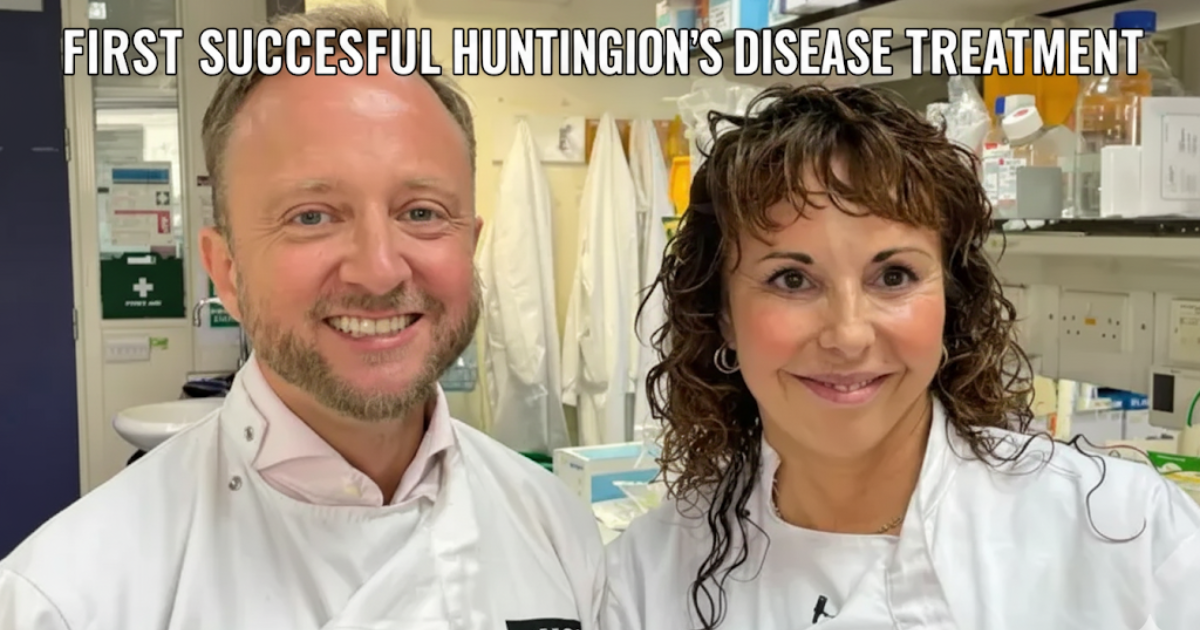The Nature of the Disease: Huntington’s is characterized as “one of the cruellest and most devastating diseases.” It’s described as relentlessly killing brain cells and exhibiting symptoms akin to a combination of dementia, Parkinson’s, and motor neurone disease, running through families due to its genetic nature.
The Breakthrough:
For the “first time,” the disease has been “successfully treated.” Crucially, the subsequent explanation clarifies that “treated successfully” refers to a significant slowing of the disease’s progression, not a complete cure, though the impact is revolutionary.
Remarkable Results:
Data indicates that the disease was slowed by an astonishing 75% in patients receiving the treatment.
Practical Impact:
This slowdown translates directly into a profound improvement in patient outlook. As Prof. Sarah Tabrizi explained, the decline typically expected in one year would now take four years post-treatment, potentially granting patients “decades of good quality life.”
Emotional Resonance:
The research team’s emotional reaction, becoming tearful when describing the data, underscores the immense human impact and significance of this scientific achievement.
For too long,
Huntington’s disease has been a relentless genetic nightmare, devastating families and earning its reputation as one of the cruelest and most destructive neurological disorders. It combines the cognitive decline of dementia, the motor challenges of Parkinson’s, and the progressive paralysis of motor neurone disease, mercilessly killing brain cells. But a beacon of hope now shines brightly, as doctors announce a monumental success: for the first time, the disease has been effectively slowed, potentially reshaping the future for thousands of patients.
Understanding the Foe:
Huntington’s Disease
“Huntington’s disease is a rare but devastating inherited neurodegenerative disorder. It stems from a faulty gene that leads to the gradual, relentless destruction of nerve cells in the brain. Symptoms typically emerge in mid-adulthood and progressively worsen, affecting a patient’s movement, cognitive abilities, and mental health, ultimately leading to complete incapacitation. Until now, treatments have primarily focused on managing symptoms rather than addressing the root cause.
A Scientific Leap Forward:
The Revolutionary Treatment
“In a truly historic scientific achievement, a dedicated team of doctors and researchers has unveiled results from a clinical trial that show an astonishing slowdown in the progression of Huntington’s disease. The innovative treatment, leveraging advanced genetic techniques, has demonstrated a remarkable 75% reduction in the rate of disease decline in treated patients. These figures represent far more than mere statistics; they signify a profound shift in our ability to combat this previously unstoppable illness.
Decades of “Good Quality Life”:
The Impact for Patients
“Professor Sarah Tabrizi, a leading figure in the research team, highlighted the life-altering implications of this breakthrough. She explained that the decline typically expected in one year would now take four years after treatment. This extraordinary shift means patients could be granted ‘decades of good quality life’—a future previously unimaginable for those diagnosed with Huntington’s. The emotional reactions of the research team, moved to tears by their own findings, underscore the immense human significance of this scientific victory.
Looking Ahead:
The Road to Widespread Access
“While the initial results are incredibly promising, the journey towards widespread availability of this treatment continues. Further research, larger trials, and regulatory approvals are still necessary to ensure its long-term safety and efficacy across diverse patient populations. However, this breakthrough lays a critical foundation, offering a tangible path forward for a disease that has long defied effective intervention.
The news
of this significant slowdown in Huntington’s disease marks a pivotal moment in medical history. It’s a testament to unwavering scientific dedication and offers profound hope to patients and their families worldwide. This isn’t just another medical advancement; it represents the dawn of a new era in the fight against neurodegenerative genetic disorders, promising a future where ‘the cruelest disease’ no longer holds absolute sway.







